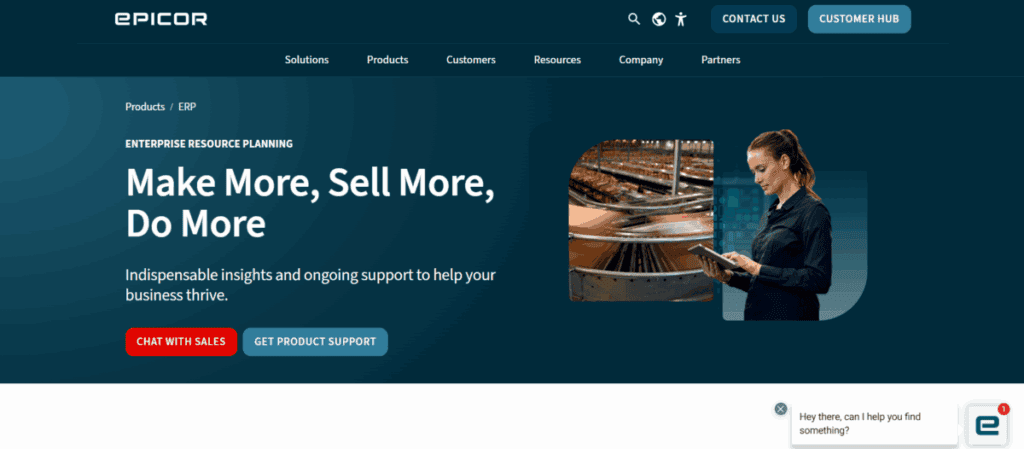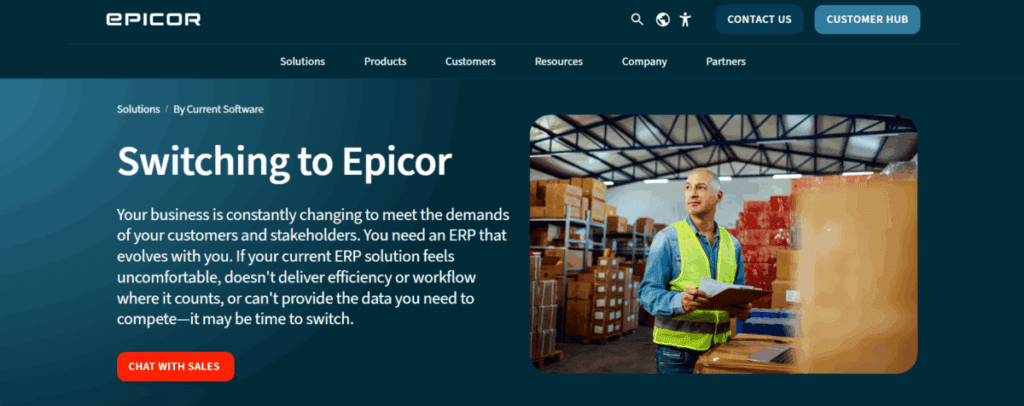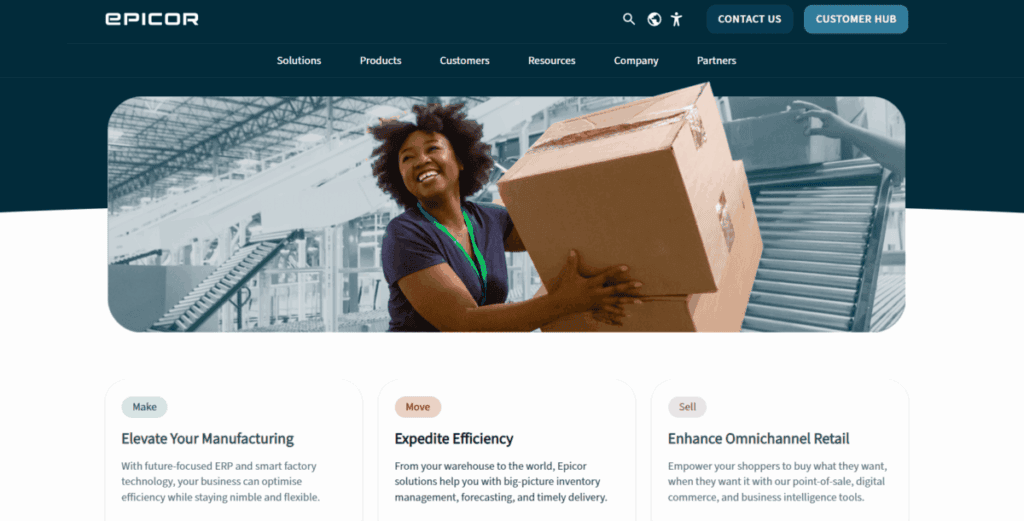
Epicor Software Review
- 17th May, 2025
- | By Linda Mae
- | Reviews
Epicor Software is a prominent ERP (Enterprise Resource Planning) provider with a history dating back to 1972. Headquartered in Austin, Texas, the company has carved a niche by offering industry-specific ERP solutions tailored mainly for manufacturing, distribution, retail, and service industries. Over the years, Epicor has transitioned from legacy systems to modern, flexible platforms, with its current flagship product being Epicor Kinetic. Lets read more about Epicor Software Review.
What differentiates Epicor from many ERP competitors is its emphasis on building deep functionality within selected industries rather than trying to serve all verticals with generic tools. This targeted approach allows companies in complex sectors like discrete manufacturing or supply chain operations to manage workflows, compliance, and resource allocation more efficiently.
In more than 150 countries, Epicor serves more than 20,000 customers. Its cloud-based and on-premise solutions give businesses flexibility according to regulatory requirements and infrastructure preferences. Due to its scalability, simplified upgrades, and reduced upfront IT costs, cloud deployment—particularly through Epicor Kinetic—is becoming more and more popular.
Epicor’s specialisation can be a double-edged sword, despite its advantages. Longer implementation timelines may result from the frequent need for the assistance of skilled consultants for customisations and configurations. Furthermore, even though Epicor offers a contemporary user interface in Kinetic, legacy users might encounter a more challenging learning curve.
Epicor essentially markets itself as a highly vertical ERP partner, perfect for companies that require customised, scalable software that closely matches operational complexity instead of off-the-shelf simplicity.
User Interface and Experience | Epicor Software Review
The user interface (UI) is one of the most noticeable improvements Epicor has made in recent years, especially with the rollout of Epicor Kinetic. Designed with responsiveness and usability in mind, Kinetic delivers a modern web-based experience that is significantly more intuitive than earlier versions of Epicor ERP. The interface is visually clean, featuring customizable dashboards and modular widgets that allow users to personalize their workspace.
Navigation is generally smooth, although users transitioning from older versions might initially struggle with the restructured layout. The menu system has been simplified, and most processes can be accessed within a few clicks. Role-based interfaces mean that a finance professional will see a different dashboard compared to someone in warehouse operations, helping to reduce clutter and improve task focus.
Epicor also supports mobile access, which is useful for teams that need real-time updates on the go, such as field service technicians or logistics managers. However, mobile usability still has room to grow compared to leading CRM or sales platforms that have invested heavily in mobile-first design.
Customization options are fairly robust. Users can add widgets, modify KPIs, and adapt workflows to match their internal processes. For tech-savvy teams, Epicor also supports low-code tools to build tailored applications within the ERP ecosystem.
That said, not all modules are equally modernized. Some legacy components still retain dated design patterns, and users have noted inconsistencies in the user experience between older and newer modules. Overall, Epicor’s UI is evolving in the right direction but may not yet be fully polished across the board.
Core ERP Capabilities
Epicor delivers a comprehensive suite of core ERP modules that cater to standard business functions such as finance, procurement, inventory management, production planning, and customer relationship management. One of its standout strengths is in manufacturing and supply chain management, where Epicor has built robust tools tailored to complex production environments.
In the finance module, users can manage general ledger, accounts payable and receivable, budgeting, and multi-currency accounting. These functions are tightly integrated, ensuring financial data flows seamlessly across departments. Inventory and warehouse management tools support real-time stock tracking, barcoding, lot control, and location-based inventory reporting.
Epicor’s production management capabilities are especially strong. The software supports job scheduling, capacity planning, material requirements planning (MRP), and shop floor control. This makes it a valuable tool for discrete manufacturers managing multi-level bills of materials and detailed routing.
Users can monitor pricing agreements, delivery performance, and communication history thanks to the system’s integrated customer and supplier relationship modules. Additionally, Epicor supports field service management, which is advantageous for businesses that provide equipment maintenance or after-sales support.
Data visibility is a benefit that is consistent across modules. Changes made in one department immediately affect other departments due to the interconnectedness of all systems, which lowers the possibility of mistakes and redundant data.
Although the breadth is admirable, some users point out that extensive configuration and training are necessary to fully utilise these features. Although the ERP’s depth is its strength, teams lacking substantial ERP experience or technical support might not be able to fully utilise it.
Industry-Specific Solutions
Epicor’s commitment to industry-specific solutions is one of its strongest differentiators. Rather than offering a one-size-fits-all product, Epicor delivers ERP configurations tailored to industries such as manufacturing, distribution, retail, automotive, and building supply. This vertical specialization helps reduce customization needs during implementation and ensures the software aligns more naturally with everyday business processes.
For example, in manufacturing, Epicor supports discrete, process, and mixed-mode production environments. Features like advanced production scheduling, quality assurance workflows, and compliance tracking (e.g., FDA, ISO) are built into the system. Distribution modules, on the other hand, emphasize logistics, order management, and multi-warehouse coordination.
Retail businesses benefit from point-of-sale (POS) integration, inventory synchronization across stores, and centralized pricing management. Epicor even offers tools for automotive aftermarket businesses, including parts tracking and supplier integration. These industry modules are often pre-configured with terminology, workflows, and reports relevant to the target sector.
Another advantage of industry specificity is better alignment with compliance needs. Whether it’s traceability in food and beverage manufacturing or regulatory documentation in healthcare equipment supply, Epicor enables businesses to manage standards without extensive workarounds.
However, industry-specific depth can also lead to siloed development. Some features built for one vertical may not be transferable or compatible with others. This can limit flexibility for companies operating across multiple sectors or those planning to pivot their business model.
In summary, Epicor’s vertical focus is a strategic strength, particularly for companies seeking ERP software that understands and supports their industry’s unique operational demands.
Deployment Options and Cloud Strategy
Epicor provides multiple deployment options, allowing businesses to choose between on-premise, cloud-hosted, or hybrid environments. This flexibility caters to a wide range of organizations, from legacy system users with strict IT policies to forward-looking companies eager to leverage the cloud.
The company’s cloud strategy centers around Epicor Kinetic, its modern, browser-based ERP built for cloud deployment using Microsoft Azure. Kinetic offers scalability, enhanced security, and easier updates compared to older systems. Cloud-based users benefit from automatic upgrades, access from anywhere, and reduced IT overhead.
Epicor still supports on-premise deployments for companies that aren’t prepared to move to the cloud. These are often selected by businesses with substantial internal infrastructure or those operating in highly regulated industries. There is also a hybrid model for businesses making a gradual transition.
The modularity of Epicor’s cloud solution is one of its selling features. Companies can begin with basic features and gradually expand them. This facilitates phased digital transformation and lowers upfront investment.
Additionally, Epicor prioritises uptime and performance optimisation, and it has service level agreements (SLAs) that help ensure business continuity. However, moving from outdated on-premise versions to the cloud may require major process and data migration changes, which call for preparation and experience.
Overall, Epicor’s deployment model is flexible and well-aligned with modern business needs, offering both legacy support and forward-thinking cloud architecture for evolving enterprises.
Integration and Compatibility
Integration is a key concern for any ERP system, and Epicor offers robust options for connecting with third-party applications. The platform supports RESTful APIs, enabling real-time data exchange with external systems such as CRMs, HR software, e-commerce platforms, and BI tools.
Epicor Kinetic, in particular, is built with an open architecture that facilitates easier integration. It supports both pre-built connectors and custom integrations through its Integration Cloud offering. This allows businesses to connect to services like Salesforce, Shopify, Microsoft Power BI, and more.
For legacy systems, Epicor provides middleware and data transformation tools to support smooth data flow. This is particularly valuable for companies undergoing phased ERP implementation or those maintaining older systems alongside newer ones.
Internal module integration is also a strong point. Financials, operations, HR, and inventory share a common database, ensuring that information stays consistent across the system. This integrated architecture reduces redundancy, improves reporting accuracy, and supports better decision-making.
However, integrating Epicor with highly customized or niche software may require developer assistance or third-party tools. While the APIs are powerful, they do require technical expertise, which might be a barrier for small businesses without a dedicated IT team.
In conclusion, Epicor’s integration framework is versatile and modern, especially for users of the Kinetic platform. It balances flexibility with structure, enabling businesses to create a connected software ecosystem that reflects their operational complexity.
Reporting, Analytics, and BI Tools
Data-driven decision-making is a priority for most businesses, and Epicor offers a range of reporting and analytics tools designed to support this need. The software includes standard reports across finance, inventory, production, and customer management, all of which can be customized or extended based on user requirements.
Epicor Kinetic incorporates advanced dashboards and visualization tools that help users track KPIs in real time. These dashboards are role-based and interactive, enabling quick access to insights without deep technical knowledge. Users can drill down into datasets, apply filters, and schedule reports for automatic distribution.
For more sophisticated analytics, Epicor provides integration with Microsoft Power BI, allowing businesses to leverage external BI tools for complex data modeling and visualization. The system also supports predictive analytics and trend analysis, particularly useful in demand forecasting and financial planning.
Another helpful feature is ad hoc reporting. Although training may be required to fully utilise this functionality, business users can create custom queries without depending on IT. For businesses that have a lot of inventory, the Smart Inventory Planning and Optimisation suite is an add-on that improves forecasting and demand analysis capabilities.
The initial report setup can be time-consuming and requires a thorough understanding of the data schema, according to some users. But once set up, the tools are strong and capable of meeting a wide range of business intelligence requirements. All things considered, Epicor’s reporting features are strong and suit companies that value operational visibility and well-informed strategy execution.
Security, Compliance, and Data Management
Security is a critical aspect of any ERP platform, and Epicor includes a comprehensive set of features to ensure data protection, user accountability, and regulatory compliance. Whether deployed on-premise or in the cloud, Epicor uses role-based access control (RBAC) to restrict user privileges based on responsibilities and clearance levels.
The cloud-based Epicor Kinetic platform benefits from Microsoft Azure’s built-in security infrastructure, including encryption, firewall protection, and continuous threat monitoring. Data is encrypted both in transit and at rest, providing a solid foundation for cybersecurity compliance.
Epicor also supports audit trails, ensuring that all system changes are logged and traceable. This is especially useful for businesses in regulated industries like pharmaceuticals or finance, where compliance standards require detailed recordkeeping. The software includes support for global compliance mandates, including GDPR for data privacy, SOX for financial transparency, and HIPAA for healthcare data security. Tools for data retention, user authentication, and document control are built into the platform.
Backup and disaster recovery options are included in cloud deployments, with daily backups and region-specific data storage available. For on-premise users, backup protocols are configurable based on internal IT policy.
Despite its security strengths, businesses should still conduct regular audits and customize settings according to their specific industry requirements. Epicor provides the tools, but proper governance is key to maximizing their value. In short, Epicor delivers a strong foundation for secure operations and compliance management, helping businesses protect their data and meet regulatory obligations with confidence.
Customer Support and Training
Epicor offers multiple layers of support, ranging from self-service options to personalized technical assistance. Customers can access a dedicated support portal for submitting tickets, browsing knowledge base articles, and tracking issue resolution. Phone and email support are available, with service levels depending on the chosen plan.
The company also maintains the Epicor Learning Center, which provides access to training modules, tutorials, and certification programs. These resources help new users get up to speed and allow experienced users to deepen their product knowledge. Webinars, live training, and guided onboarding are part of the broader support ecosystem.
The user base of Epicor is yet another important resource. Users can work together with people going through similar difficulties, participate in customer conferences, and join discussion forums. Peer support often supplements formal support channels, especially when it comes to resolving particular configuration problems or exploring module use cases.
However, some users have had conflicting experiences with how responsive Epicor’s customer service is. Minor or complicated technical questions may take longer to resolve than major issues, which are usually resolved quickly. High-level support can occasionally be accessed only with premium plans or additional costs.
All things considered, Epicor’s support system is strong, particularly for businesses that take the time to use the resources offered. The intricacy of the problem and the promptness of the designated consultants or partners can both affect the quality of the support.
Pricing and Licensing Structure
Epicor’s pricing model varies depending on deployment type, modules selected, and the size of the organization. While the company does not publish fixed pricing, it generally follows a modular approach, allowing businesses to pay for only the features they use.
Licensing options include both subscription-based pricing for cloud users and perpetual licensing for on-premise deployments. Cloud pricing usually includes ongoing updates, hosting, and support, while on-premise setups involve upfront costs for software and hardware, plus annual maintenance fees.
Epicor’s total cost of ownership (TCO) should factor in not just licensing, but also implementation, customization, training, and ongoing support. These costs can add up quickly, especially for businesses requiring deep configuration or integration with other systems. While Epicor is often seen as more affordable than some Tier 1 ERP platforms like SAP or Oracle, it may still be cost-prohibitive for small businesses. However, its scalability makes it a viable long-term investment for mid-sized companies expecting to grow.
In some regions or industries, Epicor partners offer packaged deals tailored to specific use cases, which can help streamline implementation and reduce costs. Still, businesses should conduct a thorough ROI analysis before committing, as customization and consulting services may significantly influence final expenses.
Frequently Asked Questions
Q1: Is Epicor suitable for small and mid-sized businesses, or just enterprises?
Epicor primarily targets mid-sized businesses but can scale up for large enterprises or down for smaller firms, particularly through modular deployment and cloud subscriptions.
Q2: How long does it typically take to implement Epicor ERP?
Implementation can range from a few months to over a year depending on the scope, customization, and deployment type. Cloud implementations are usually faster than on-premise.
Q3: What makes Epicor stand out compared to other ERP platforms like NetSuite or SAP?
Epicor stands out for its deep industry-specific features, flexible deployment options, and strong manufacturing and distribution capabilities, whereas competitors may focus more on broader appeal or enterprise scalability.



